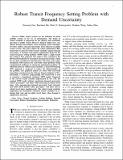Robust Transit Frequency Setting Problem With Demand Uncertainty
Author(s)
Guo, Xiaotong; Mo, Baichuan; Koutsopoulos, Haris N; Wang, Shenhao; Zhao, Jinhua
DownloadAccepted version (3.629Mb)
Open Access Policy
Open Access Policy
Creative Commons Attribution-Noncommercial-Share Alike
Terms of use
Metadata
Show full item recordAbstract
Public transit systems are the backbone of urban
mobility systems in the era of urbanization. The design of
transit schedules is important for the efficient and sustainable
operation of public transit. However, limited studies have considered demand uncertainties when designing transit schedules.
To better address demand uncertainty issues inherent in public
transit systems, this paper utilizes the robust optimization (RO)
framework to generate robust transit schedules against demand
uncertainty. A nominal (non-robust) optimization model for the
transit frequency setting problem (TFSP) under a single transit
line setting is first proposed. The model is then extended to the
RO-based formulation to incorporate demand uncertainty, which
has not been considered in the literature. The large-scale origindestination (OD) matrices for real-world transit problems bring
computational challenges in solving the optimization problem. To
efficiently generate robust transit schedules, a Transit Downsizing
(TD) approach is proposed to reduce the dimensionality of
the problem. The proposed models are tested with real-world
transit lines and data from the Chicago Transit Authority (CTA).
Meanwhile, a stochastic programming (SP) framework is used
to construct a benchmark stochastic TFSP model. Compared
to the current transit schedule implemented by the CTA, the
nominal TFSP model without considering demand uncertainty
reduces passengers’ wait times while increasing in-vehicle travel
times. After incorporating demand uncertainty, both stochastic
and robust TFSP models reduce passengers’ wait times and invehicle travel times simultaneously. The robust transit schedules
outperform the benchmark stochastic transit schedules by reducing both wait and in-vehicle travel times when demand is
significantly uncertain.
Date issued
2024Department
Massachusetts Institute of Technology. Department of Civil and Environmental Engineering; Massachusetts Institute of Technology. Department of Urban Studies and PlanningJournal
IEEE Transactions on Intelligent Transportation Systems
Publisher
Institute of Electrical and Electronics Engineers (IEEE)
Citation
X. Guo, B. Mo, H. N. Koutsopoulos, S. Wang and J. Zhao, "Robust Transit Frequency Setting Problem With Demand Uncertainty," in IEEE Transactions on Intelligent Transportation Systems.
Version: Author's final manuscript